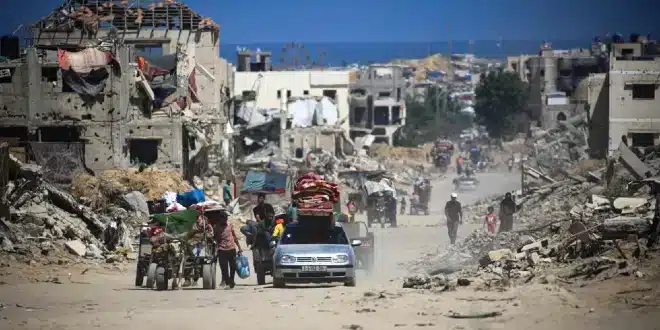Hamas has given preliminary approval to a U.S.-backed proposal for a phased cease-fire in Gaza, dropping its earlier demand for Israel to commit upfront to a complete end to the war, according to Hamas and Egyptian officials on Saturday.
This compromise from Hamas, which controls Gaza and initiated the war with its attack on Israel on October 7, could lead to the first pause in fighting since November and pave the way for further negotiations to end the nine-month-long conflict. However, officials caution that an agreement is not yet certain.
In Gaza, the Health Ministry reported that an Israeli airstrike on a school-turned-shelter killed at least 16 people, including children, and wounded 50 others in the Nuseirat refugee camp. The Israeli military claimed it targeted “terrorists” operating near the school and attempted to minimize civilian casualties.
Two officials, speaking anonymously due to the ongoing negotiations, said the U.S.-proposed phased deal would start with a “full and complete” six-week cease-fire. During this period, older, sick, and female hostages would be released in exchange for hundreds of Palestinian prisoners. Israeli forces would withdraw from densely populated areas of Gaza, allowing displaced people to return to their homes in northern Gaza.
A senior Hamas official confirmed that female soldiers would be among the first hostages released. During the cease-fire, Hamas, Israel, and mediators would negotiate the terms for the second phase, potentially involving the release of remaining male hostages, both civilians and soldiers, in exchange for more Palestinian prisoners. The third phase would address any remaining hostages, including the return of deceased bodies, and initiate a reconstruction project.
Hamas is seeking written guarantees from mediators to ensure Israel will continue to negotiate a permanent cease-fire after the first phase. The Hamas official said the group’s approval followed “verbal commitments and guarantees” that the war would not resume and negotiations would persist until a permanent cease-fire is achieved. “Now we want these guarantees on paper,” the official added.
Months of intermittent cease-fire talks have faltered over Hamas’s insistence on a complete end to the war. Israeli Prime Minister Benjamin Netanyahu has offered to pause the fighting but not end it until Israel’s goals of dismantling Hamas’s military capabilities and retrieving all hostages are met.
Hamas is concerned that Israel will resume the war once hostages are released. Israeli officials fear Hamas may prolong the talks and initial cease-fire indefinitely without releasing all hostages.
Netanyahu’s office did not respond to requests for comment, and there was no immediate comment from Washington. On Friday, Netanyahu confirmed that Mossad’s chief had visited Qatar, a key mediator, but noted that “gaps between the parties” remained.
Hostage families expressed cautious optimism. “For the first time in many months, we feel hopeful,” they said in a statement. “Netanyahu, we have seen how you repeatedly thwart deals in real-time. Don’t you dare break our hearts again.” Anti-government protests continued on Saturday night.
The conflict began with Hamas’s unprecedented attack on southern Israel on October 7, reportedly killing 1,200 people, mostly civilians, and abducting about 250. Israel claims Hamas still holds around 120 hostages, about a third of whom are presumed dead.
Since then, Israel’s air and ground offensive has killed over 38,000 people in Gaza, according to Gaza’s Health Ministry. The offensive has caused widespread destruction and a humanitarian crisis, leaving hundreds of thousands on the brink of famine, international officials report.
The cease-fire deal would allow about 600 trucks of humanitarian aid to enter Gaza daily, with half directed to the heavily affected north. Recent Israeli assaults on Rafah have severely reduced aid supplies entering Gaza.
“We want to eat, but from where we can eat? The country is exhausted. The country is destitute. It is not suitable for living,” said Walid Hegazi, a resident of the Jabaliya refugee camp in northern Gaza. “We’re sorry for the donkeys because we ate their wheat and barley.”
Also on Saturday, the Hamas-run Interior Ministry reported that four police officers were killed in an Israeli airstrike in Rafah. The ministry said the officers were on foot patrols when the strike occurred, with eight other officers wounded. Israel’s military did not immediately respond to questions.


